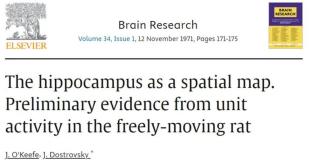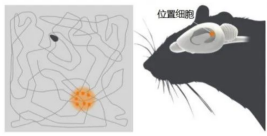Please click the button below to go to our email login page
|
Giving up Moon Mission, and winning the Nobel Prize for accidentally discovering brain’s inner GPS systemWhy are we born with the ability to perceive exactly our position in the vast
world? Even if lost in unfamiliar places, one can rediscover his/her footprints
through continuous exploration and memory. To answer this question, Dr. John O’Keefe embarked on scientific exploration with a shift from the fields of psychology and philosophy to neuroscience.
Giving up Apollo mission and starting a journey to scientific research. John O’Keefe was born in New York, the USA, and worked at an airline through self-directed learning after graduating from high school. He was eager to pursue some novel and cutting-edge scientific fields, so he also took aerospace and aeronautical engineering courses in New York University in his spare time besides work. However, long-term, high-intensity work and study have put immense pressure on him, and he yearned to be able to freely conduct academic exploration. When the company offered him the opportunity to participate in the development of the lunar module in the Apollo mission, he made an astonishing decision ---giving up the Apollo mission and returning to school for further education as a student. In the college time, O’Keefe has developed a consuming passion for psychology and philosophy, and believed that some long-standing philosophical problems can possibly be solved by researching brain. Hence, after earning a bachelor’s degree, he went to McGill University, where he began neuroscience research.
Sticking at exploration from silent cells to misplace cells. In McGill University, O’Keefe worked in the laboratory of the psychologist Ronald Melzack, researching the sensory properties of the amygdala. He completed a doctorate degree in physiological psychology, and later joined University College London (UCL) as a postdoctoral research fellow, continuing to engage in research related to neurophysiology. During research, O’Keefe and his students found that the damage in hippocampus region results in behavioral deficiency of animals, with the root cause of the loss of the “cognitive map”-related nervous system, and these findings have been published in the journal Brain Research.
In 1976, O’Keefe published another research, reporting that there are other types of cells associated with spatial orientation in hippocampus, termed misplace cells. When an animal reaches a familiar position but discovers a change in the spatial layout of that position, the misplace cells will be activated to the greatest extent.
Winning the Nobel Prize for the milestone findings In 1978, O’Keefe and Dr. Lynn Nadel jointly published The Hippocampus as a Cognitive Map, describing in detail a pivotal theory that places the “cognitive map” specifically in the hippocampus of animals. In 2014, Dr. O’Keefe won the Nobel Prize for Physiology or Medicine for “his discovery of cells that constitute the positioning system of brain”. The exploration on “inner GPS” system in brain by Dr. O’Keefe provides experimental evidence for understanding how animals (including humans) locate, navigate, and remember spatial information in the environment and also provides important insights for neuroscience research. His discovery is a milestone in the field of neuroscience, leaving a far-reaching influence on human cognitive research. |




